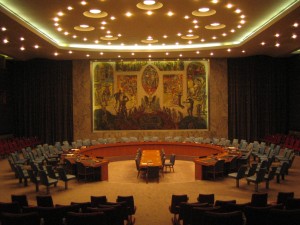Print Edition: October 30, 2013
Saudi Arabia has been one of the West’s key allies in the Middle East. They give us what we want: oil.
But geopolitical cracks are starting to form. This week the Saudis rejected a seat on the United Nations Security Council (UNSC). Both the Saudis and the western powers want a regime change in Syria. But the main reason Saudi Arabia declined the seat was to protest the lack of action after Syria’s government was accused of using chemical weapons on civilians. Perhaps this is a chance for Saudi Arabia to show they doesn’t need the West as a consumer anymore: China may be willing to pay more for Saudi oil.
When one country wants to invade another, it is supposed to get permission from the UNSC. The council is comprised of 15 different countries, but only five countries (the U.S., the U.K., France, Russia, and China) have veto power.
Veto power is a big a deal.
If the UNSC wants to give the green light for international intervention in Syria, any of the big five can veto it. Russia and the United States don’t tend to see eye-to-eye very often, so most initiatives are vetoed.
In the case of Bush’s catastrophic adventure into Iraq, the UNSC didn’t hold an official vote. It was known that there would not be enough “yes” countries – there need to be at least nine of the 15 in favour to pass a resolution. Many times countries don’t vote at all, and keep in mind, one of the big five can always step in with a veto.
The UNSC only regulates nations. Obama doesn’t get the United Nations’ permission to send drones into Yemen or Pakistan. He does what he wants. Obama’s rationale is that drones only attack non-state actors that are a direct threat to the sovereignty of his state. Never mind when they miss.
When it comes to enforcement of international law, we have an age-old problem with the UNSC. It functions as a platform for international diplomacy, but has little teeth. To be on the council is a matter of prestige among states as much as it’s a matter of security.
But the UNSC isn’t just a big party for international bureaucrats. It sets policy standards that do have weight: economic sanctions and investigations into war crimes.
There have been many attempts to reform the veto system of the UNSC, but it is feared that tinkering with it may have unintended consequences. If more member seats are added there will be more arguments. If the veto system is removed, the balance of power may shift radically.
Overall, the Saudis rejected their seat because they see the UNSC as an extension of the western powers that created it. The West’s support for the Arab spring has been opposed by the Saudis, who rule with a strictly traditionalist form of government.
There has also been a cooling between Iran and the United States. Iran is one of Saudi Arabia’s foes in the region. Iran used to be clearly anti-American, but the tone is changing. America still loves Saudi oil, but it feels like the political tectonic plates are shifting.
Is Canada on the council? Not anymore. We lost our seat to Portugal, a tiny and economically poor country. The sad fact is, we don’t play nice with the world like we used to. Our national policy has focused on being friendly with key trading partners, pumping out oil, and moving away from our peacekeeping tradition.
We’re more like Saudi Arabia than we think.


